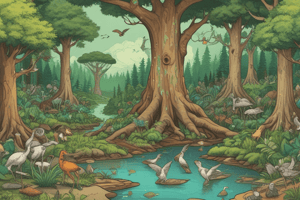Podcast
Questions and Answers
What is the definition of the biosphere?
What is the definition of the biosphere?
The regions of Earth occupied by living organisms.
What is the definition of a sustainable environment?
What is the definition of a sustainable environment?
The environment consists of all the living and non-living things on the Earth and how they interact with each other.
What is the study of how living and non-living things on Earth interact with each other called?
What is the study of how living and non-living things on Earth interact with each other called?
Ecology.
Which of the following are examples of abiotic factors?
Which of the following are examples of abiotic factors?
What is biodiversity?
What is biodiversity?
What does sustainability describe?
What does sustainability describe?
What is a species?
What is a species?
What is a population?
What is a population?
What is a community?
What is a community?
What is stewardship?
What is stewardship?
What is an ecosystem?
What is an ecosystem?
What is a biome?
What is a biome?
All healthy ecosystems have diverse structures.
All healthy ecosystems have diverse structures.
What are nutrient cycles?
What are nutrient cycles?
Energy is cycled through an ecosystem.
Energy is cycled through an ecosystem.
Flashcards
Biosphere
Biosphere
The biosphere is the regions of Earth occupied by living organisms.
Sustainable Environment
Sustainable Environment
The environment consists of all the living and non-living things on the Earth and how they interact with each other.
Ecology
Ecology
Ecology is the study of how living and non-living things on Earth interact with each other.
Abiotic Factors
Abiotic Factors
Signup and view all the flashcards
Biotic Factors
Biotic Factors
Signup and view all the flashcards
Biodiversity
Biodiversity
Signup and view all the flashcards
Sustainability
Sustainability
Signup and view all the flashcards
Species
Species
Signup and view all the flashcards
Population
Population
Signup and view all the flashcards
Community
Community
Signup and view all the flashcards
Stewardship
Stewardship
Signup and view all the flashcards
Ecosystems
Ecosystems
Signup and view all the flashcards
Biomes
Biomes
Signup and view all the flashcards
Diverse Structure
Diverse Structure
Signup and view all the flashcards
Nutrient Cycles
Nutrient Cycles
Signup and view all the flashcards
Energy Flows
Energy Flows
Signup and view all the flashcards
Photosynthesis
Photosynthesis
Signup and view all the flashcards
Cellular Respiration
Cellular Respiration
Signup and view all the flashcards
Food Chain
Food Chain
Signup and view all the flashcards
Food Web
Food Web
Signup and view all the flashcards
Producers
Producers
Signup and view all the flashcards
Consumers
Consumers
Signup and view all the flashcards
Decomposers
Decomposers
Signup and view all the flashcards
Mutualism
Mutualism
Signup and view all the flashcards
Parasitism
Parasitism
Signup and view all the flashcards
Commensalism
Commensalism
Signup and view all the flashcards
Carrying Capacity
Carrying Capacity
Signup and view all the flashcards
Limiting Factors
Limiting Factors
Signup and view all the flashcards
Ecological Disturbances
Ecological Disturbances
Signup and view all the flashcards
Ecological Resilience
Ecological Resilience
Signup and view all the flashcards
Study Notes
Ecological Concepts
- Biosphere: The regions of Earth where living organisms exist.
- Sustainable Environment: All living and non-living things on Earth and their interconnections.
- Ecology: The study of how living and non-living things interact.
- Abiotic Factors: Non-living parts of an ecosystem (e.g., temperature, water, CO2).
- Biotic Factors: Living parts of an ecosystem (e.g., plants, animals, bacteria).
- Biodiversity: Variety of organisms in an area; associated with healthy ecosystems.
- Sustainability: The ability of populations to reproduce indefinitely.
- Species: A group of similar organisms that can naturally interbreed.
- Population: A group of the same species living in the same area.
- Community: The populations of different species interacting in an area.
- Stewardship: Taking care of something, like an environment.
- Ecosystems: The relationships between organisms and their environment.
- Biomes: Collections of ecosystems with the same dominant plant life.
- Diverse Structure: Healthy ecosystems have various organisms, each with a specific role (niche).
- Nutrient Cycles: Cycles that allow nutrients to be absorbed and reused by organisms in ecosystems.
- Energy Flows: Energy originates from the sun and flows through food chains; energy is not recycled.
Studying That Suits You
Use AI to generate personalized quizzes and flashcards to suit your learning preferences.




